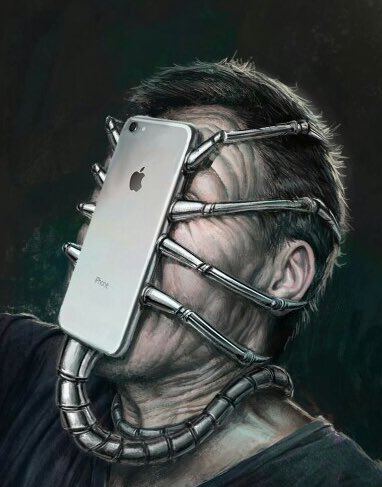CTVNews.ca Staff
Published Thursday, November 30, 2017
New research finds that young people who become addicted to smartphones and the internet actually develop chemistry imbalances in their brains. Researchers from Korea University in Seoul, South Korea, conducted a small study on 10 teen girls and 9 boys who had all been diagnosed with internet or smartphone addiction. Their average age was 15.5 years old.
The researchers used standardized addiction tests to measure the severity of the teens’ addiction to their phones, including asking them the extent to which their smartphone use affected their daily life, their social life, productivity, sleeping patterns and mood. All the addicted teenagers had significantly higher scores in depression, anxiety, insomnia and impulsivity. The researchers then used magnetic resonance spectroscopy (MRS) -- a type of MRI that measures the brain's chemical composition – to better understand the brains of the addicted teens, by comparing their scans with 19 gender- and age-matched healthy controls.
They looked at the anterior cingulate area of the brain, which has been shown to play a large role in addiction. They looked specifically at levels of gamma aminobutyric acid, or GABA, a neurotransmitter that plays a role in the regulation of vision and motor control, as well as anxiety. They also looked at levels of glutamate-glutamine (Glx), a neurotransmitter that causes neurons to become more electrically excited. They found the ratio of GABA to Glx was significantly increased in the smartphone- and internet-addicted youth compared to the healthy controls. High GABA levels have been linked to many side effects, including drowsiness and anxiety. The study’s lead researcher, Dr. Hyung Suk Seo, professor of neuroradiology, believes that increased GABA in the brains of the internet and smartphone addiction may be related to their loss of regulation in the parts of their brains that control cognition and emotion.
Twelve of the 19 addicted youth went on to receive nine weeks of cognitive behavioral therapy to deal with their addiction. Further MRS scans showed that GABA to Glx ratios in those addicted youth significantly decreased or normalized after therapy. The study was presented at the annual meeting of the Radiological Society of North America.
https://www.ctvnews.ca/mobile/health...rain-1.3700931
- Home
- Forum
- Chat
- Donate
- What's New?
-
Site Links

-
Avalon Library

-
External Sites

- Solari Report | Catherine Austin Fitts
- The Wall Will Fall | Vanessa Beeley
- Unsafe Space | Keri Smith
- Giza Death Star | Joseph P. Farrell
- The Last American Vagabond
- Caitlin Johnstone
- John Pilger
- Voltaire Network
- Suspicious Observers
- Peak Prosperity | Chris Martenson
- Dark Journalist
- The Black Vault
- Global Research | Michael Chossudovsky
- Corbett Report
- Infowars
- Natural News
- Ice Age Farmer
- Dr. Joseph Mercola
- Childrens Health Defense
- Geoengineering Watch | Dane Wigington
- Truthstream Media
- Unlimited Hangout | Whitney Webb
- Wikileaks index
- Vaccine Impact
- Eva Bartlett (In Gaza blog)
- Scott Ritter
- Redacted (Natalie & Clayton Morris)
- Judging Freedom (Andrew Napolitano)
- Alexander Mercouris
- The Duran
- Simplicius The Thinker





 Reply With Quote
Reply With Quote








Bookmarks